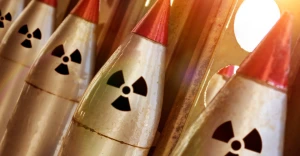
Borrell explains whether grain spat may hinder Ukraine's EU membership
Ukraine's conflict with neighboring states over grain will not be an obstacle on its way to the European Union. At the same time, the country must overcome the challenges of the war with Russia Ukraine's conflict with neighboring states over grain will not be an obstacle on its way to the European Union. At the same time, the country must overcome the challenges of the war with Russia
EU’s most senior diplomat Josep Borrell said this in an interview with The Guardian.
Asked whether the disputes between some Eastern European countries and Ukraine over grain exports are a harbinger of conflicts that may arise if the country joins the EU, Borrell replied: "Everybody knows, it’s going to be difficult, because Ukraine, first of all, is at war and is being destroyed, literally. Second, it had to do a lot of reforms even before the war. And third, at this moment, Ukraine being a member of the European Union, it would be the only country that would be a net beneficiary"He noted that both the bloc and Ukraine will have to go through a long process of reforms.
Some details regarding ban on Ukraine grain imports
On May 2, the European Commission adopted temporary safeguard measures against imports of certain agricultural products from Ukraine to 5 EU countries. Initially, the ban was to be in place until June 5.
On May 12, Poland, Bulgaria, Romania, Slovakia, and Hungary called on the European Commission to extend the embargo on agricultural products from Ukraine until the end of the year.
On Friday, September 15, the European Commission decided not to extend the ban on Ukrainian grain exports to the EU: Poland, Hungary, and Slovakia announced that they would extend the embargo unilaterally.
Ukraine has filed a lawsuit with the WTO against the EU countries that maintain restrictions on grain imports. At the same time, Poland said it would not change its decision because it was trying to protect local farmers.
Ukraine announced that it may stop importing apples, onions, cabbage, and tomatoes from Poland.
In response, Polish Prime Minister Mateusz Morawiecki said that the country would no longer transfer weapons to Ukraine, but would arm itself. Polish politician Mirosław Czech said that Poland stopped supplying Ukraine with free weapons a long time ago, and the last tanks arrived last year or in early 2023.
- News














































